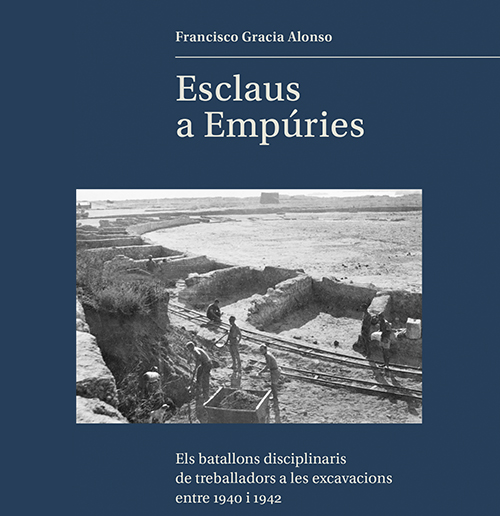Dark times in the history of Empúries


With research on the documentation from several archives in Madrid, Barcelona, Salamanca, Guadalajara and Àvila about the testimonials of some prisoners —their experiences are collected in the book’s annex—,
Esclaus a Empúries. Els batallons disciplinaris de treballadors a les excavacions entre 1940 i 1942, published by UB Editions, narrates an episode of the history which is significant and unknown, and which shows the Francoist repression in Catalonia. It also shows the collusion with the facts of broad sectors of Catalan politics, intelectuals and society, which joined, sometimes enthusiastically, the dictatorship’s punishment strategies.
After the introduction, the volume puts Emnpúries as a model in archaeology in Catalonia and contextualizes the site during the Spanish Civil War. It features a chapter dedicated to the exile of the archaeologist and prehistorian Pere Bosch Gimpera, and Martín Almargo’s arrival, who became the director of the archaeological site and drove his career with an ideological speech that went along with the politics of the regime. The nucleus of the book offers the reader the details of the living and working conditions of the workers battalions in Catalonia, and, specifically, information on the two contingents that worked in Empúries: the Disciplinary Battalion of Workers 71 and the Disciplinary Battalion of Working Soldiers 46. Prior to the epilogue, the author explains how, after March 1943, troops replaced battalion workers.
Francisco Gracia Alonso (Barcelona, 1960) is a professor of Prehistory at the University of Barcelona and head of the Research Group in Protohistoric Archaeology (GRAP). His lines of research are the protohistory in the Iberian Peninsula, the war in the ancient world, and historiography of archaeology. He has published Pere Bosch Gimpera. Universidad, política, exilio (2011); Salvem l’art. La protecció del patrimoni cultural català durant la Guerra Civil (2011, with Glòria Munilla), and Lluís Pericot. Un prehistoriador entre dos épocas (2017). With UB Editions, he has recently published La construcción de una identidad nacional. Arqueología, patrimonio y nacionalismo en Cataluña (1850-1939) (2018) and Ciencia y política. La organización de la arqueología y la prehistoria en España (1850-1939) (2021).
